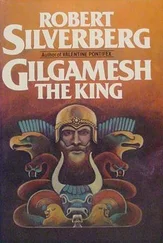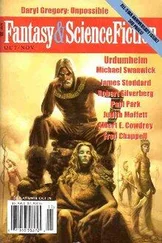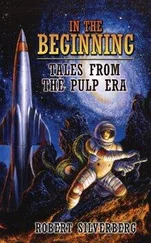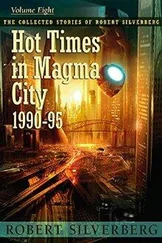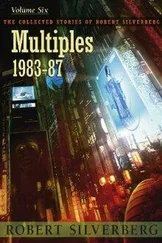Robert Silverberg - Thomas the Proclaimer
Здесь есть возможность читать онлайн «Robert Silverberg - Thomas the Proclaimer» весь текст электронной книги совершенно бесплатно (целиком полную версию без сокращений). В некоторых случаях можно слушать аудио, скачать через торрент в формате fb2 и присутствует краткое содержание. Год выпуска: 2012, ISBN: 2012, Издательство: Subterranean Press, Жанр: Фантастика и фэнтези, на английском языке. Описание произведения, (предисловие) а так же отзывы посетителей доступны на портале библиотеки ЛибКат.
- Название:Thomas the Proclaimer
- Автор:
- Издательство:Subterranean Press
- Жанр:
- Год:2012
- ISBN:978-1-59606-509-3
- Рейтинг книги:5 / 5. Голосов: 1
-
Избранное:Добавить в избранное
- Отзывы:
-
Ваша оценка:
- 100
- 1
- 2
- 3
- 4
- 5
Thomas the Proclaimer: краткое содержание, описание и аннотация
Предлагаем к чтению аннотацию, описание, краткое содержание или предисловие (зависит от того, что написал сам автор книги «Thomas the Proclaimer»). Если вы не нашли необходимую информацию о книге — напишите в комментариях, мы постараемся отыскать её.
Thomas the Proclaimer — читать онлайн бесплатно полную книгу (весь текст) целиком
Ниже представлен текст книги, разбитый по страницам. Система сохранения места последней прочитанной страницы, позволяет с удобством читать онлайн бесплатно книгу «Thomas the Proclaimer», без необходимости каждый раз заново искать на чём Вы остановились. Поставьте закладку, и сможете в любой момент перейти на страницу, на которой закончили чтение.
Интервал:
Закладка:
Kraft, lips clamped tautly, changes stations. The resonant baritone voice pursues him.
—that peace is maintained and the forces of justice are strengthened in—
Kraft turns on his television set. The screen shows nothing but the channel insignia. Across the top of the screen gleams a bright-green title:
ALLEGED VOICE OF GOD
and across the bottom, in frantic scarlet, is a second caption:
BY LIVE PICKUP FROM THE MOON
The Deity, meanwhile, has moved smoothly on to new themes. All the problems of the world, He observes, can be attributed to the rise and spread of atheistic socialism. The false prophet Karl Marx, aided by the Antichrist Lenin and the subsidiary demons Stalin and Mao, have set loose in the world a plague of godlessness that has tainted the entire twentieth century and, here at the dawn of the twenty-first, must at last be eradicated. For a long time the zealous godly folk of the world resisted the pernicious Bolshevik doctrines, God continues, His voice still lucid and reasonable; but in the past twenty years an accommodation with the powers of darkness has come into effect, and this has allowed spreading corruption to infect even such splendidly righteous lands as Japan, Brazil, the German Federal Republic, and God’s own beloved United States of America. The foul philosophy of coexistence has led to a step-by-step entrapment of the forces of good, and as a result—
Kraft finds all of this quite odd. Is God speaking to every nation in English, or is He speaking Japanese to the Japanese, Hebrew to the Israelis, Croatian to the Croats, Bulgarian to the Bulgars? And when did God become so staunch a defender of the capitalist ethic? Kraft recalls something about driving money-changers out of the temple, long ago. But now the voice of God appears to be demanding a holy war against communism. Kraft hears Him calling on the legions of the sanctified to attack the Marxist foe wherever the red flag flies. Sack embassies and consulates, burn the houses of ardent left-wingers, destroy libraries and other sources of dangerous propaganda, the Lord advises. He says everything in a level, civilized tone.
Abruptly, in midsentence, the voice of the Almighty vanishes from the airwaves. A short time later an announcer, unable to conceal his chagrin, declares that the broadcast was a hoax contrived by bored technicians in a satellite relay station. Investigations have begun to determine how so many radio and television stations let themselves be persuaded to transmit it as a public-interest item. But for many godless Marxists the revelation comes too late. The requested sackings and lootings have occurred in dozens of cities. Hundreds of diplomats, guards, and clerical workers have been slain by maddened mobs bent on doing the Lord’s work. Property losses are immense. An international crisis is developing, and there are scattered reports of retribution against American citizens in several eastern European countries. We live in strange times, Kraft tells himself. He prays. For himself. For Thomas. For all mankind. Lord have mercy. Amen. Amen. Amen.
Thirteen
The Burial of Faith
The line of march begins at the city line and runs westward out of town into the suburban maze. The marchers, at least a thousand of them, stride vigorously forward even though a dank, oppressive heat enfolds them. On they go, past the park dense with the dark-green leaves of late summer, past the highway cloverleaf, past the row of burned motels and filling stations, past the bombed reservoir, past the cemeteries, heading for the municipal dumping-grounds.
Gifford, leading the long sober procession, wears ordinary classroom clothes: a pair of worn khaki trousers, a loose-fitting gray shirt, and old leather sandals. Originally there had been some talk of having the most important Discerners come garbed in their academic robes, but Gifford had vetoed that on the grounds that it wasn’t in keeping with the spirit of the ceremony. Today all of the old superstitions and pomposities were to be laid to rest; why then bedeck the chief iconoclasts in hieratic costume as though they were priests, as though this new creed were going to be just as full of mummery as the outmoded religions it hoped to supplant?
Because the marchers are so simply dressed, the contrast is all the more striking between the plain garments they wear and the elaborate, rich-textured ecclesiastical paraphernalia they carry. No one is empty-handed; each has some vestment, some sacred artifact, some work of scripture. Draped over Gifford’s left arm is a large white linen alb, ornately embroidered, with a dangling silken cincture. The man behind him carries a deacon’s dalmatic; the third marcher has a handsome chasuble; the fourth, a splendid cope. The rest of the priestly gear is close behind: amice, stole, maniple, vimpa. A frosty-eyed woman well along in years waves a crozier aloft; the man beside her wears a mitre at a mockingly rakish angle. Here are cassocks, surplices, hoods, tippets, cottas, rochets, mozettas, mantellettas, chimeres, and much more: virtually everything, in fact, save the papal tiara itself. Here are chalices, crucifixes, thuribles, fonts; three men struggle beneath a marvelously carved fragment of a pulpit; a little band of marchers displays Greek Orthodox outfits, the rhason and the sticharion, the epitrachelion and the epimanikia, the sakkos, the epigonation, the zone, the omophorion; they brandish ikons and enkolpia, dikerotrikera and dikanikion. Austere Presbyterian gowns may be seen, and rabbinical yarmulkes and tallithim and tfilin. Farther back in the procession one may observe more exotic holy objects, prayer wheels and tonkas, sudras and kustis, idols of fifty sorts, things sacred to Confucianists, Shintoists, Parsees, Buddhists both Mahayana and Hinayana, Jains, Sikhs, animists of no formal rite, and others. The marchers have shofars, mezuzahs, candelabra, communion trays, even collection plates; no portable element of faith has been ignored. And of course the holy books of the world are well represented: an infinity of Old and New Testaments, the Koran, the Bhagavad-Gita, the Upanishads, the Tao Te Ching, the Vedas, the Vedanta Sutra, the Talmud, the Book of the Dead, and more. Gifford has been queasy about destroying books, for that is an act with ugly undertones; but these are extreme times, and extreme measures are required. Therefore he has given his consent even for that.
Much of the material the marchers carry was freely contributed, mostly by disgruntled members of congregations, some of it given by disaffected clergymen themselves. The other objects come mostly from churches or museums plundered during the civil disturbances. But the Discerners have done no plundering of their own; they have merely accepted donations and picked up some artifacts that rioters had scattered in the streets. On this point Gifford was most strict: acquisition of material. by force was prohibited. Thus the robes and emblems of the newly founded creeds are seen but sparsely today, since Awaiters and Propitiators Propritiators and their like would hardly have been inclined to contribute to Gifford’s festival of destruction.
They have reached the municipal dump now. It is a vast fiat wasteland, surprisingly aseptic-looking: there are large areas of meadow, and the unreclaimed regions of the dump have been neatly graded and mulched, in readiness for the scheduled autumn planting of grass. The marchers put down their burdens and the chief Discerners come forward to take spades and shovels from a truck that has accompanied them. Gifford looks up; helicopters hover and television cameras bristle in the sky. This event will have extensive coverage. He turns to face the others and intones, “Let this ceremony mark the end of all ceremonies. Let this rite usher in a time without rites. Let reason rule forevermore.”
Читать дальшеИнтервал:
Закладка:
Похожие книги на «Thomas the Proclaimer»
Представляем Вашему вниманию похожие книги на «Thomas the Proclaimer» списком для выбора. Мы отобрали схожую по названию и смыслу литературу в надежде предоставить читателям больше вариантов отыскать новые, интересные, ещё непрочитанные произведения.
Обсуждение, отзывы о книге «Thomas the Proclaimer» и просто собственные мнения читателей. Оставьте ваши комментарии, напишите, что Вы думаете о произведении, его смысле или главных героях. Укажите что конкретно понравилось, а что нет, и почему Вы так считаете.

